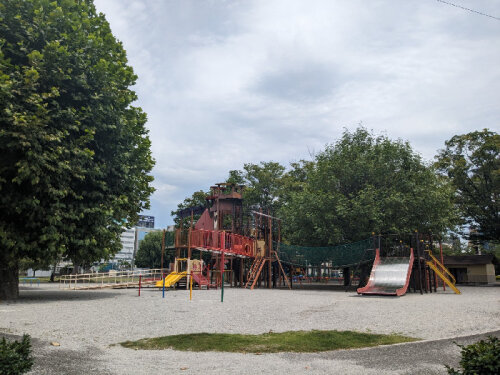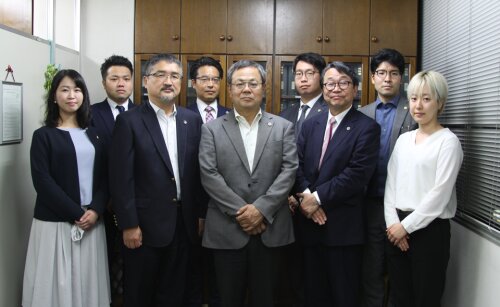Best Personal Injury Lawyers in Shizuoka
Share your needs with us, get contacted by law firms.
Free. Takes 2 min.
List of the best lawyers in Shizuoka, Japan
About Personal Injury Law in Shizuoka, Japan
Personal injury law in Japan covers cases where a person suffers physical or psychological harm because of another party's actions or omissions. In Shizuoka Prefecture, as elsewhere in Japan, the legal basis for compensating injury is primarily found in the Civil Code - most notably the tort rule that requires a person who causes damage by an unlawful act or negligence to compensate the victim. Personal injury cases commonly arise from traffic accidents, workplace accidents, medical malpractice, slip-and-fall incidents, product defects and intentional assaults.
Procedures and outcomes are influenced by both national laws and local practices in Shizuoka courts and administrative offices. Cases can often be resolved through negotiation with insurers, mediation or court proceedings. Local lawyers, called bengoshi, can advise on the best path given the facts, likely compensation, and time limits that apply.
Why You May Need a Lawyer
A lawyer can be essential in many personal injury situations. Common scenarios where legal help is useful include:
- Traffic accidents involving significant injury, disputed fault or inadequate insurance offers.
- Workplace injuries where the employer or an outside party may be responsible, or where workers' compensation benefits are contested.
- Medical malpractice claims where proof of negligent treatment, causation and damages is complex.
- Cases with permanent disability, long-term care needs or where future income is affected.
- Fatal injuries where family members seek compensation for loss of support or funeral costs.
- Disputes with insurance companies over the amount or scope of compensation, or early settlement offers that may not cover future needs.
- Situations with multiple parties or complex causation questions that require legal and expert evidence on negligence and damages.
Lawyers help collect and preserve evidence, calculate damages (medical costs, lost income, future care, pain and suffering), negotiate with insurers, represent clients in mediation or court and explain legal deadlines and procedures.
Local Laws Overview
Key legal points relevant to personal injury cases in Shizuoka include:
- Tort Liability under the Civil Code: The general tort rule requires compensation when an unlawful act or negligence causes damage. This covers intentional and negligent acts.
- Statute of Limitations: There are time limits for bringing a claim. In general, tort claims must be brought within three years from when the injured person became aware of the damage and the tortfeasor, and there is an absolute limit that typically bars claims after 20 years from the event. Prompt action is important to avoid losing legal rights.
- Traffic and Motor Insurance Law: The Automobile Liability Security Act establishes compulsory motor vehicle liability insurance (jibaiseki hoken) that provides minimum compensation for bodily injury. Many drivers also carry voluntary insurance for broader coverage.
- Workers' Compensation System: Workplace injuries are addressed through the Workers' Accident Compensation Insurance system. This system provides administrative benefits for work-related injuries and illnesses; separate civil claims against negligent third parties may also be possible.
- Medical Negligence: Medical malpractice claims are evaluated on whether healthcare providers breached the standard of care and whether that breach caused the injury. These cases often require expert medical opinions.
- Comparative Fault and Reduction of Damages: Courts assess fault for each party and reduce compensation in proportion to the injured party's share of responsibility. Establishing causation and fault is central to recovering full compensation.
- Dispute Resolution Options: Many cases are resolved through negotiations with insurers. When negotiations stall, parties can use mediation or court procedures. District courts and local conciliation and mediation services in Shizuoka provide formal dispute-resolution paths without a full trial in many cases.
- Evidence and Documentation: Police accident reports, medical records, receipts for expenses, employment and wage records, witness statements and photos are critical evidence. Preserving this information early strengthens a claim.
Frequently Asked Questions
What kinds of incidents count as personal injury in Shizuoka?
Personal injury covers physical harm, psychological injury and related financial losses caused by another party. Common incidents are traffic accidents, workplace accidents, medical errors, slips and falls in public or private places, defective products and intentional assaults.
How soon should I see a lawyer after an injury?
Consult a lawyer as soon as practicable after immediate medical care and any required police or employer reports. Early legal advice helps preserve evidence, meet procedural deadlines, and avoid accepting inadequate early settlement offers from insurers.
What information and documents should I collect right away?
Collect medical records and receipts, photos of injuries and accident scene, police reports, contact details of witnesses, details about the other party and their insurer, employer incident reports if at work, and records of lost wages. Keep a diary of symptoms and treatment.
How is compensation calculated?
Compensation typically covers medical expenses, lost income, future care needs, rehabilitation costs, property damage and non-pecuniary damages such as pain and suffering (慰謝料). Calculation methods vary by case and may use court precedents, insurer guidelines and expert estimates for future losses.
What are the time limits for filing a claim?
There are statutory time limits. A commonly applicable rule is three years from when the injured person became aware of the damage and the responsible party, and an absolute time limit often exists that bars claims long after the event (for example, 20 years from the act). Specific deadlines depend on the type of claim, so seek prompt legal advice.
Can I recover damages if I was partially at fault?
Yes. Japanese courts allocate fault among parties and reduce damages proportional to the injured party's share of responsibility. A lawyer can argue for a fair allocation based on the facts to minimize reductions.
What if the other party has no insurance or is a hit-and-run driver?
Compulsory motor insurance provides minimum compensation in many traffic cases, and there are often procedures to seek compensation even when an at-fault driver cannot be identified or is uninsured. A lawyer can explain available insurance schemes, government-backed compensation measures and civil remedies.
Will I have to go to court?
Not necessarily. Many personal injury cases are settled through negotiation with insurers or through mediation. If settlement fails, cases may proceed to court. A lawyer can advise on the chances of settlement versus litigation and represent you at each stage.
How do legal fees work in Japan for personal injury cases?
Fee arrangements vary. Some lawyers charge hourly rates, flat fees or a combination of initial fees plus a success fee. For traffic accident cases, contingency-style arrangements may be available. Ask a prospective lawyer about fee structure, retainer requirements and whether any initial consultation is free or reduced.
What local offices or contacts should I notify after an accident?
After urgent medical care, notify the police for traffic accidents, your employer for workplace incidents, and your insurer if applicable. For legal help, contact a local lawyer or the Shizuoka Bar Association for referrals, and consider contacting the Japan Legal Support Center (Houterasu) or local consumer and labor offices depending on the type of injury.
Additional Resources
Helpful organizations and offices for people in Shizuoka include:
- Shizuoka Prefectural Police - traffic division and local police stations for accident reports and investigations.
- Shizuoka Bar Association (Shizuoka Bengoshi-kai) for lawyer referrals and information about legal services.
- Japan Legal Support Center - Houterasu - a national public service that provides legal information, referrals and legal-aid consultations.
- Local District and Summary Courts in Shizuoka Prefecture for information on mediation and civil procedures.
- Labour Standards Inspection Office for workplace injury reports and guidance on Workers' Accident Compensation Insurance.
- Consumer Affairs Center and the National Consumer Affairs Center of Japan for disputes involving defective products or services.
- Ministry of Health, Labour and Welfare for information on workers' compensation and labor-related protections.
- National and private insurance companies for information on compulsory and voluntary motor insurance coverage and claims procedures.
- Hospitals and patient consultation services for medical malpractice concerns; some hospitals have an internal complaint or inquiry office.
Next Steps
If you need legal assistance for a personal injury in Shizuoka, follow these practical steps:
1. Get immediate medical attention. Your health and safety come first. Ensure all treatment is documented and keep copies of medical records and bills.
2. Report the incident. For traffic accidents contact the police. For workplace injuries notify your employer and the relevant labor office. File official reports where required.
3. Preserve evidence. Take photos, record witness names and contact details, keep receipts, and write a clear timeline of what happened while details are fresh.
4. Notify your insurer. Inform your own insurance company early to begin any necessary claims procedures, but avoid accepting final settlements without legal advice.
5. Seek legal advice. Contact a local bengoshi with experience in personal injury and insurance claims. Ask about experience with similar cases, fee arrangements and whether an initial consultation is available.
6. Consider legal aid if needed. If you cannot afford a lawyer, contact Houterasu or the Shizuoka Bar Association to discuss eligibility for publicly supported legal assistance or referral services.
7. Follow a lawyer's guidance on negotiation, mediation or court. A lawyer will help assess the strength of your claim, gather evidence, negotiate with insurers and represent you in mediation or litigation if necessary.
Taking prompt, documented steps increases the chance of a fair outcome. Local legal professionals and public support services in Shizuoka can guide you through each stage from medical documentation to final resolution.
Lawzana helps you find the best lawyers and law firms in Shizuoka through a curated and pre-screened list of qualified legal professionals. Our platform offers rankings and detailed profiles of attorneys and law firms, allowing you to compare based on practice areas, including Personal Injury, experience, and client feedback.
Each profile includes a description of the firm's areas of practice, client reviews, team members and partners, year of establishment, spoken languages, office locations, contact information, social media presence, and any published articles or resources. Most firms on our platform speak English and are experienced in both local and international legal matters.
Get a quote from top-rated law firms in Shizuoka, Japan — quickly, securely, and without unnecessary hassle.
Disclaimer:
The information provided on this page is for general informational purposes only and does not constitute legal advice. While we strive to ensure the accuracy and relevance of the content, legal information may change over time, and interpretations of the law can vary. You should always consult with a qualified legal professional for advice specific to your situation.
We disclaim all liability for actions taken or not taken based on the content of this page. If you believe any information is incorrect or outdated, please contact us, and we will review and update it where appropriate.











